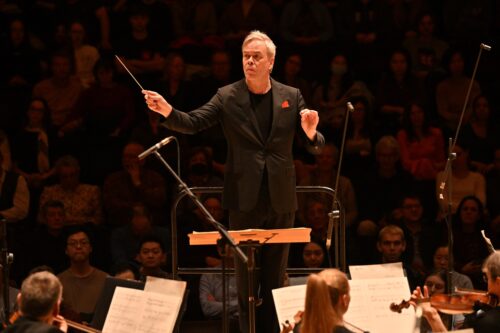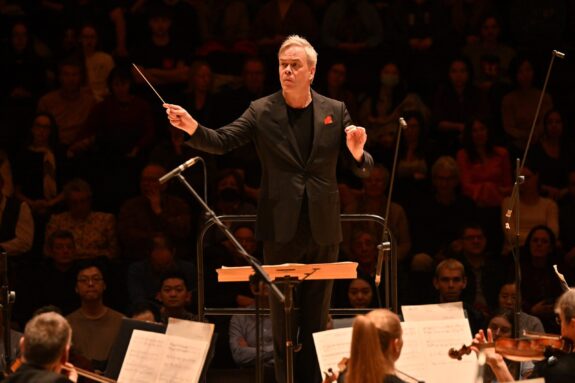 United Kingdom Haydn, Moussa, R. Strauss: Nardus Williams (soprano), Jennifer Johnston (mezzo-soprano), Laurence Kilsby (tenor), Derek Welton (bass-baritone), BBC Symphony Chorus and Orchestra / Hannu Lintu (conductor). Barbican Hall, London, 29.11.2024. (KMcD)
United Kingdom Haydn, Moussa, R. Strauss: Nardus Williams (soprano), Jennifer Johnston (mezzo-soprano), Laurence Kilsby (tenor), Derek Welton (bass-baritone), BBC Symphony Chorus and Orchestra / Hannu Lintu (conductor). Barbican Hall, London, 29.11.2024. (KMcD)

Haydn – Mass in D minor ‘Nelsonmesse’, Hob. XXII:11
Samy Moussa – Elysium
Richard Strauss – Ein Heldenleben
The BBC Symphony Orchestra, with Hannu Lintu on the podium, presented a programme of contrasting musical styles at the Barbican featuring Haydn’s Nelson Mass, Samy Moussa’s Elysium, and Richard Strauss’s Ein Heldenleben. Whilst there was often much to admire, the choice of repertoire seemed confused.
The evening began with Haydn’s Nelson Mass, a work rich in dramatic contrasts and lyrical beauty. The BBC Symphony Chorus and Orchestra were joined by an excellent quartet of soloists: Nardus Williams (soprano), Jennifer Johnston (mezzo-soprano), Lawrence Kilsby (tenor), and Derek Welton (bass). They were all superb – each bringing exceptional musicality and character to their parts. Williams’s radiant soprano shone particularly in the Et incarnatus est, where her delicate phrasing and control gave the section an ethereal quality. Johnston’s warm mezzo complemented her beautifully, adding depth to the Qui tollis passages.
Welton’s bass-baritone delivered clarity and resonance and having a Berlin Wotan, and Bayreuth Amfortas engaged for the part was indeed a luxury. He gave full voice to the part’s more declamatory passages, most notably in a wonderfully bronzed Qui tollis peccata mundi. Meanwhile, Kilsby’s tenor provided a fine balance in the ensemble passages, excelling in the quartet sections such as the Benedictus, where all four soloists blended seamlessly.
The orchestra, under Lintu’s direction, gave a swift, polished reading of the score. Highlights included the assertive brass fanfares that punctuate the Kyrie, reminding the audience of the work’s wartime origins, and the strings’ beautifully restrained playing in the Sanctus. In the Agnus Dei, the woodwinds added a lyrical counterpoint, curling out of the texture with elegance. However, the orchestra’s lush modern tone occasionally felt at odds with the work’s classical roots, particularly in the lighter movements, where Haydn’s transparency seemed buried under too much weight. Remarkably, there wasn’t even the slightest nod to period practice – not even hard-hit timps, which would have at least given the work some sense of period tang. The orchestra was assembled with the Richard Strauss in mind, so it is no wonder that too many compromises had to be made for this performance. And why everyone sang in a generic Italianate style as opposed to Germanic – we need those hard g sounds in the Agnus Dei – is anyone’s guess.
The BBC Symphony Chorus offered moments of brilliance, particularly in their balance and diction. Yet, their dynamics leaned too heavily on the forte end of the spectrum, making passages like the Credo come across as relentless. There were, however, some wonderfully executed moments, such as the hushed, introspective opening to the Sanctus and where their pianissimos were exquisitely judged. These glimpses of subtlety made the otherwise over enthusiastic choral approach feel like a missed opportunity to explore Haydn’s dynamic range more fully.
Following the Haydn, Moussa’s Elysium served as a meditative contrast. The work’s lush harmonic progressions and atmospheric orchestration were brought to life by the orchestra, with Lintu drawing out every nuance of timbre and texture. The shimmering interplay between strings, brass, and tuned percussion offered a suitable moment of reflection between the classical and romantic grandeur of Strauss’s tone poem.
The concert concluded with Strauss’s Ein Heldenleben, which stood as the evening’s crowning achievement. From the heroic opening to the reflective closing bars, the BBC Symphony Orchestra demonstrated remarkable technical wizardry and emotional depth. Igor Yuzefovich, the orchestra’s concert master, was particularly outstanding in the role of The Hero’s Companion, his violin solos capturing the tenderness and complexity of Strauss’s portrait of his wife to perfection.
Strauss’s dense orchestral textures were handled with precision, from the biting woodwinds in the adversaries’ section to the glowing warmth of the hero’s triumph. The brass section, including nine French horns no less, delivered power and clarity, especially in the climactic final sections. Lintu’s control over the ebb and flow of Strauss’s sprawling narrative ensured a performance that was both cohesive and thrilling.
Despite the exceptional performances, the programme itself felt disjointed. The Nelson Mass, with its classical clarity and religious gravitas, seemed oddly placed alongside the opulence of Strauss and Moussa. A historically informed approach, or a different pairing, would have given the evening a greater sense of coherence.
Nevertheless, the concert showcased the versatility of the BBC Symphony Orchestra and Lintu’s interpretative skills.
Keith McDonnell
